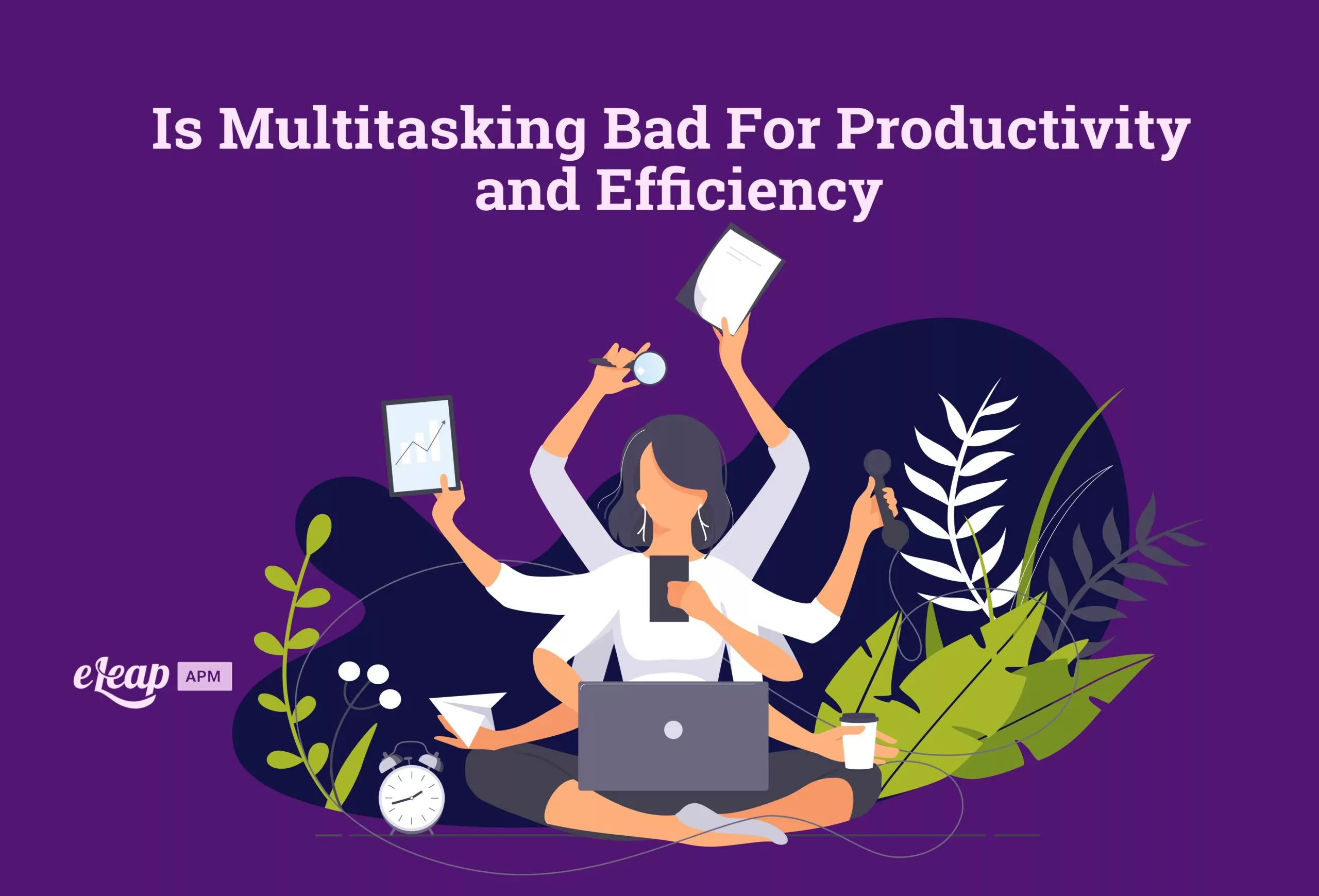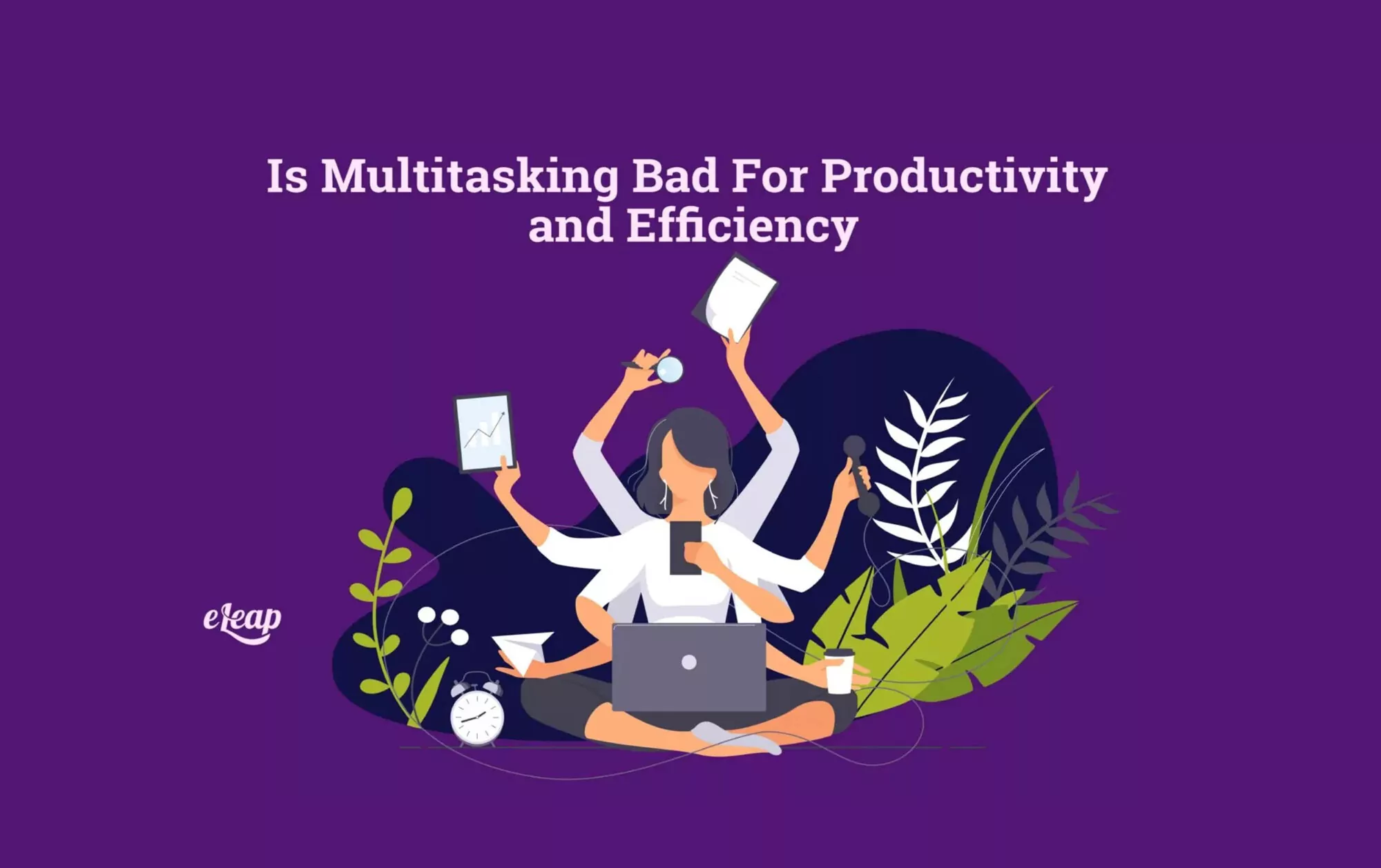Is Multitasking Bad for Productivity and Efficiency?

Today’s society is used to doing more than one thing at a time, but is multitasking bad? With the advent of so many technologies, it’s common to see people working at a laptop with their personal and work cell phones ready. Perhaps they’ve got a podcast or audiobook on, too, or are watching the news to keep up on industry news or politics. Explore how eLeaP®’s Performance Management Platform can simplify evaluations, boost productivity, and drive measurable results.
Whew! It’s exhausting just to read about that situation. However, this is how many people live and work all day. Technology is supposed to make our lives easier and more streamlined. Instead, it overwhelms us, and we are expected to do more simultaneously.
Recent Stanford research shows that constant multitasking is stressful. It promotes negative moods and keeps motivation and productivity low.
Our brains have not evolved enough to keep up with the steady influx of information from all sources of technology. When people are bombarded with information from multiple sources, their brains struggle to process everything effectively.

This creates a lack of productivity and inefficiency for multiple reasons. These include:
- Memory retention – Humans can’t remember information as well when taking in tidbits from multiple sources simultaneously.
- Attention span − Concentration begins again each time someone’s attention goes from one information source to another. This decreases brain power and energy.
- Switching tasks − Even something as simple as typing away at a document and then answering a quick text causes a break in the thought process.
So, why do we multitask, and how do we stop? Let’s explore.
Why We Know Multitasking Is Bad for You
There are plenty of reasons why people began multitasking. The advent of modern technologies and appliances has taken over much work, and we expect ourselves to do more. However, more isn’t always better.
Your Brain Can’t Keep Up
It’s often toted as a positive quality to “successfully” complete multiple tasks simultaneously. However, your brain can only focus on one thing at a time. So, when you timeshare more than one activity, each isn’t getting your full attention.
How often have you met someone new and instantly forgotten their name? You were probably focused on something else, such as what you would say to answer a question, the task you were pulled away from, or something happening on the other side of the room.
People talk about the importance of being present. It doesn’t feel good to have someone’s attention broken when you’re talking to them, right? If they look at their phone, have another eye on the TV, or are wrapped up in their thoughts, they don’t feel seen or heard.
Instead of trying to keep up with more than one thing at a time, give your all. If you must redirect, ask for a moment to finish your task so you can concentrate fully on the next one. This shows respect and value for the person or thing you attend.
Multitasking Equals Multi-Mistaking
It makes perfect sense that the less focus you apply to something, the more mistakes you make. When you try to take in multiple streams of information at once, your brain struggles to filter out what’s essential and what’s not. This stage means your brain goes haywire, even if it doesn’t feel like it. Synapses cross-fire, focus overlaps, and mistakes abound.
Sometimes, these mistakes might not seem like a big deal. Maybe you put the leftovers on the wrong shelf in the fridge or switched your kids’ pajamas when putting laundry away. However, they could also be more catastrophic, such as replying to a company email when you have a deeply personal matter to discuss with your boss.
If you don’t want to deal with the effects of multitasking mistakes, focus on one task at a time. You will still complete what needs to be done. Overall, it will take a few more minutes, but the quality will be worth it. Plus, you won’t have to go back and fix something later!
Multitasking Dampens Memory; It Doesn’t Improve It
You might think you’re helping your brain stay active and fit when you ask it to simultaneously keep up with multiple tasks. Unfortunately, the opposite is true. Multitasking hampers short-term memory. This process is never a good thing, mainly because our short-term memory worsens as we age.
If you are holding yourself to certain expectations now and your memory is struggling to keep up, think about how hard it will be to perform the same level of tasks in the future. Instead, cultivate healthy habits and boundaries to keep living well.
Anxiety as a Side Effect of Multitasking
Anxiety seems to be related to everything in our society. For any task, relationship, or activity, you probably know someone who says that it gives them anxiety.
Anxious feelings create a great deal of mental and emotional stress, which often present in physical ways, such as:
- Elevated heart rate
- High blood pressure
- Headaches
- Chronic pain
When you have access to multiple streams of technology, information, or tasks, your attention is constantly pulled in varying directions about what you should be doing. For example, whenever you pick up your phone, those little red numbers encourage you to check your email, Facebook, Instagram, and Twitter. What should you do first, how long should you spend, and why did you even pick up your phone in the first place?
It’s no wonder this lifestyle creates anxiety. Our heart rates go up, our emotions are wired, and we feel overstimulated at the slightest addition to our environment. People who live or work in a more stimulation-free environment produce higher-quality work and are less stressed.
Multitasking Prevents Creative Flow
Creativity requires working memory. Multitasking inhibits working memory because people can’t get past the short-term memory to the next level. Multitasking means keeping your brain working in a heightened, stressful state instead of a relaxed, free-flowing one.
Sure, you might be able to complete what’s asked of you when you multitask. However, it will be without the level of innovation and critical thinking that is possible with more focus.
Remember how we discussed the fact that multitasking creates anxiety? Anxiety and stress raise cortisol levels in the brain, which causes it to function at a more primitive “fight or flight” level. You’ll get done what needs to be done, and no more.
A brain that is constantly in this state of danger won’t function at its highest capability. Think about what you want to accomplish. More tasks at a lower level of quality? Or better performance with more focused attention?
Multitasking Doesn’t Save Time, It Wastes Time
Since your brain can only focus on one task at a time, trying to complete more than one thing simultaneously means it takes longer to do everything. Each time your attention is pulled away to something else, it uses time and energy to shift back to the other activity.
Multitasking also prevents a flow state. Think about how fast time flies when reading a great book on the beach or binge-watching your favorite show with a bowl of popcorn. In the context of work, when your brain is entirely focused on one thing, you get “in the zone.” Thus, you’re able to work up to five times more efficiently.
Live Less to Live More
If you ask people why they multitask, most would probably say it’s because so much is expected of them to live a whole life. People today try to:
- Work full-time jobs, often with too many responsibilities
- Spend hours in traffic to get to and from work, school, or errands
- Care for their homes
- Nurture their families, often paying attention to educational aspects
- Exercise each day and eat a healthy diet
- Keep up with friends and extended family
- Budget and spend wisely to live within their means, yet simultaneously keep up with the Joneses.
- Engage in hobbies or activities that keep them fulfilled
- Leave time for spiritual and/or emotional development
- Get 8-9 hours of quality sleep each night
It’s an impossible mountain to climb. People do whatever they have to to feel they’re checking off task after task to keep their heads above water. Instead, choosing the most important thing at the moment and giving it your full attention frees you up to do the next with the same amount of energy.
Conclusion
The bottom line is that multitasking is bad for you and your brain. Even if it’s hard to break the multitasking cycle, give specific tasks your full attention each day.
Notice how much easier they seem or how much more productive you are when focusing on one thing at a time. Take those positive realizations and continue using your brain to its entire power.